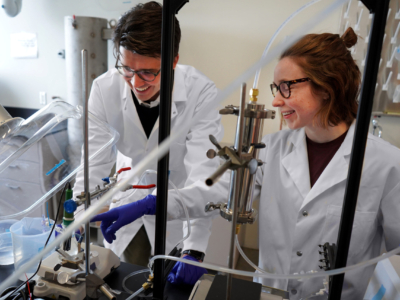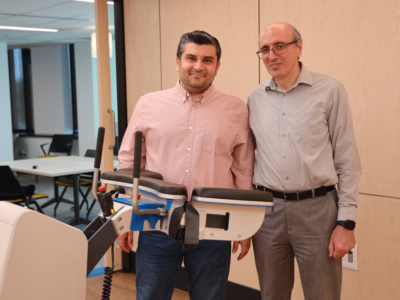Catherine McKenna, minister of Environment and Climate Change visited the Carleton University campus on Friday, July 26 to announce that Cynthia Cruickshank has received $5.1 million in funding from the NRCan Energy Innovation Program and the Ontario Research Fund (ORF) to develop new building envelope technologies that make Canada’s buildings more energy efficient and less greenhouse gas intensive.
“Carleton continues to take the lead on advances in sustainable construction,” said Rafik Goubran, vice-president (Research and International). “The Carleton’s Centre for Advanced Building Envelope Research (CU-CABER) research program will foster clean energy innovation and play an important role in developing new solutions leading to more efficient, resilient buildings.”
Drawing upon advances in super-thin insulation materials, prefabricated construction and panelized retrofits, CU-CABER will develop new approaches to constructing building envelopes that are thinner, cheaper, and new methods for renovating existing buildings with less cost and less disruption.
“Solutions for existing buildings will play the biggest role in meeting Canada’s climate change goals,” said Cruickshank, professor in the Department of Mechanical and Aerospace Engineering and director of CU-CABER. “Although Canada will construct nearly four million new homes before 2030, more than 13.7 million homes are already built, and 62 per cent of them were constructed more than 20 years ago, before the National Building Code prescribed requirements for energy efficiency.”
As part of this work, Carleton will collaborate with researchers at Algonquin College and the Cold Climate Housing Research Center to conceive, prototype, evaluate and optimize new building envelope systems. In addition, the project will enable future collaborations with key players in the built environment such as researchers from NRCan’s CanmetENERGY-Ottawa laboratories, and the National Research Council.
To complete these trials, CU-CABER researchers will create new experimental infrastructure. The funding supports the construction of large-scale building envelope test equipment, including a state-of-the-art, two-story guarded hot box with a spray rack, capable of testing full-scale residential and building facades, and a materials characterization lab.
The new infrastructure will enable researchers to study how heat, air and moisture move through materials and highly insulated wall systems, and how these elements contribute to occupant health, comfort and building science risks, including condensation, mold growth and rot. This research will create innovation opportunities for Canada’s manufacturing, construction and renovation industries and provide new technical solutions to cut heat loss in buildings and reduce the cost associated with net zero ready and deep energy retrofit construction.
CU-CABER will also foster knowledge mobilization by training the workforce that will ultimately put this research into practice. It will be located at the CanmetENERGY complex in Ottawa.
“CU-CABER’s partnership between Carleton and Algonquin College is especially valuable as it creates learning opportunities at all levels in the workforce – including construction trades, building design professionals, engineers and project managers, and building science researchers,” said Cruickshank.
Monday, July 29, 2019 in Energy, Faculty, Mechanical and Aerospace Engineering, Research, Sustainability, Women in Engineering & IT
Share: Twitter, Facebook



